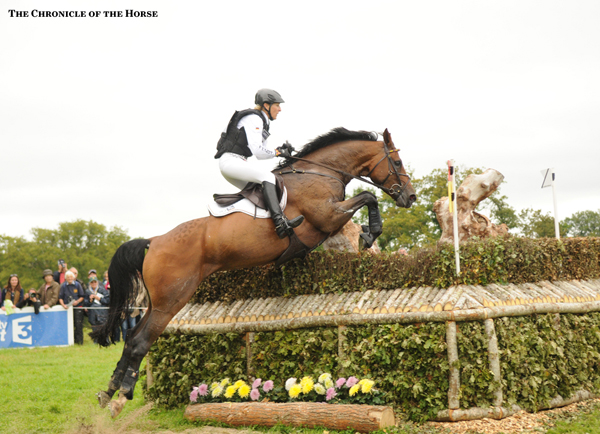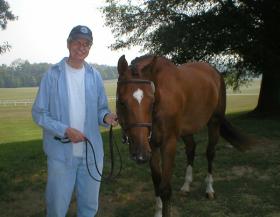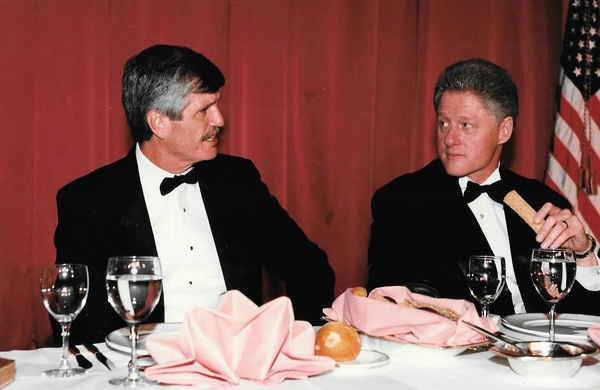
If I’ve learned anything from this past year it was the lasting impact of my father’s example and guidance on my life. Not only in how his words shaped me but the psychological road map he provided on how to successfully navigate life moving forward.
(This is Part 2 of a two-part blog entry. Read Part 1, which looks at the lessons Sean learned from his late father Larry McQuillan.)
Roughly 10 years ago my father had to endure one of the most unfair moments life can throw at us, at least in my mind. He had just completed his term as President of The White House Correspondence Association and was at the pinnacle of his profession. At the time he was one of the top correspondents for Reuters, a leading news wire service in the industry. While my dad absolutely adored his co-workers and all the company stood for, he had to think of the big picture and what was best for his family.
Though he never had any intention of leaving Reuters, another international news service approached him about joining their company. The new editors at this paper were making a push to be at the forefront of the industry and sought to hire the best of the best from the White House press pool. Offering a significant increase in benefits and salary that would potentially secure my family’s financial situation, my dad accepted their offer.
Less than a year after taking the job along with several other top reporters the paper switched editors again. The new editors decided to reverse course and go toward a youth movement and lower overhead. After decades perfecting his craft and living his dream, my dad, along with those other leading reporters hired at the same time as him, were out of a job.
In the rugged world of the news media where the philosophy is “what have you done for me lately,” my dad soon discovered that once you’re out; you’re out. Reuters had already moved on with the journalist who had replaced him and he was considered too old and too expensive because of his résumé for another news service to bring him on. In the blink of an eye, the career he loved was over.
While my dad had every right to wallow in grief and anger over how unfair life could be, he did the opposite. He took it as an opportunity at the age of 59 to reinvent himself. He accepted the position as head of public relations for The American Institute of Research. A company he diligently worked at until the day he passed away.
As I come to terms with the grief of losing my father, I use that moment in my dad’s life as my blueprint on how to successfully move forward. Pain and adversity should not be viewed as a burden to bear, but rather as an opportunity to learn, reinvent yourself accordingly and grow.
To be honest, I struggled to remember this lesson for much of the year and I felt the effects. That’s OK though. I cherish the time I was able to take being there for my dad no matter how painful it was. Now is my moment to take from the experience and the lessons learned to re-commit myself to my craft and take the next step as a professional and as a person.
The philosophy that my father had toward life and that I’m working to emulate is not an unusual concept. What is consistent among people who obtain and retain success in life is not only a confidence in their abilities and beliefs but the capacity to adapt to situations. This ability that my dad epitomized enables individuals to not only endure during the changing times but to thrive and become leaders in their industry.
This outlook is not only imperative to all of our personal journeys—it’s vital to the sustained growth of the equestrian community as a whole in today’s social media culture.
The Fédération Equestre International, recognizing the need for adaptability, recently convened to discuss potential changes to keep our sports viable and relevant on the world stage. While some of the proposed changes have been met by some derision in the horse community (Equestrian Triathlon…really?), I applaud the governing body’s attempt to learn from the past rather then dwell on any short comings in order for us to thrive moving forward.
There is a saying that positive beliefs draw positive situations and conversely negative draws negative. As I re-embrace my father’s views on life after this past year’s trials, I have come to experience that first hand.
A few weeks ago I had the opportunity to witness a remarkable product in action created by a company named SAP at the Washington International Horse Show (D.C.). Their application allowed fans in the stands during the equitation championship to judge the rounds in real time on their phones to then compare against the official judge’s scores. What a truly innovative idea and a huge hit with the spectators. (You can read more about the SAP judging app in the Nov. 9 issue of The Chronicle of the Horse.)
By making the sport inclusive to the general public, SAP’s product had a two-fold effect. Not only do the fans become much more invested in what is happening in the ring, but they also became educated on the nuances of the riding by having the ability to compare their scores with those of the judges.
After seeing this in action, I was lucky enough to have the opportunity to speak with Torie Clarke, head of global corporate affairs for SAP to learn more about the company and their interest in equestrian sports. (As a side note and affirmation to me that my dad is still with me as my guardian angel, as Torie and I chatted I discovered she herself had at one point been a political correspondent and knew my dad well from his days at Reuters…pretty interesting coincidence don’t you think?)
SAP is a leading company in the IT industry providing real-time data and analytics to businesses worldwide. After their applications helped revolutionize the way companies are run, SAP expanded the use of their applications to the sports world including equestrian sports. I discovered that what I witnessed at WIHS was just the tip of the iceberg. The application I saw on display was also in use earlier this year at the Dressage European Championships in Aachen, Germany. During each test, spectators were given real time video footage on their phones with a break down of each individual movement’s requirements and the ability to score each movement while comparing to the judges scores, all while the action is happening.
For my sport of eventing, spectators are able to watch on their phones or computers real-time video of the cross-country action from the rider’s perspective with the use of helmet cams. As you’re watching the action, you’re provided live data of what speed the horse is traveling, what lines are being ridden in the combinations, etc. To me, the possibilities of this application to our sport are endless.
The use of this as a training tool, giving riders real time data and analytics to compare to what we’re feeling, could take our riding to the next level. Ingrid Klimke uses the SAP program in her training and raves on how much it’s helped her improve as a competitor. If the Germans use it and swear by it, then count me in!

The bigger picture though is how SAP could be instrumental in selling our world to the larger public. In the age of social media, if we can draw the public in and educate them about what our sport is about while creating a sense of investment between the public and the riders through real time video and data accessible on their phone it could be a huge boost.
Maybe some day there will be fantasy leagues for the equine athletes like they have in football! A man can dream….
The point is, we’re only held back by our own self-imposed limitations. I applaud companies like SAP for their outside-the-box, forward-thinking approach and know that their technologies have the potential to be real game-changers in equestrian sport. For us in the equestrian community, to ensure the continued growth of our sports in today’s world, it’s imperative we meet the challenges to come head on.
From changing demographics and development of open land to the exponential growth of technology and social media, these are not obstacles but rather opportunities for us to reinvent ourselves as an industry to take the next step. Life is full of challenges and not always easy but it is what we make of it. This is how my dad viewed the world and inspired his son. I only hope I can inspire my daughters in the same way. If I can accomplish that, then I’ve accomplished it all.













